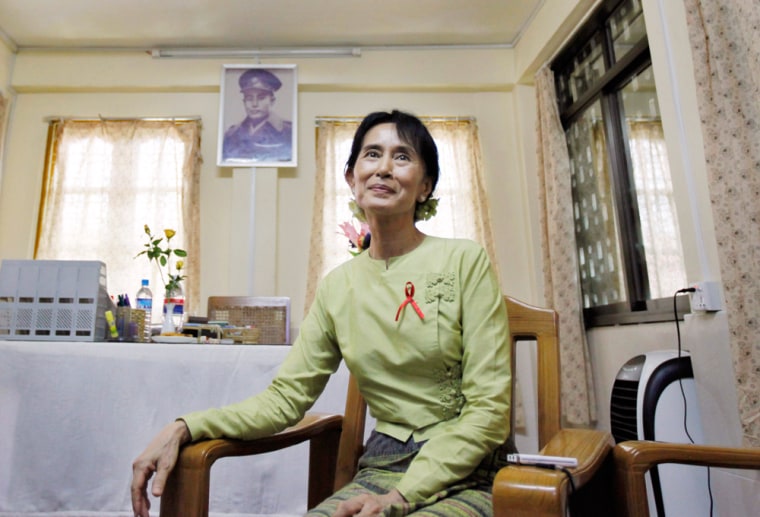Myanmar's democracy icon Aung San Suu Kyi said Thursday that her recent release from seven years of detention did not signal a softening in the military's harsh, decades-long rule of the Southeast Asian nation.
In an interview with The Associated Press, Suu Kyi called her detention "illegal" and said she was released simply because the decreed period of her house arrest had ended.
"I don't think there were any other reasons," she said in an interview in her small, Spartan office, decorated with little beyond a vase of flowers and a black and white photograph of her late father, Aung San, who helped lead colonial Burma to independence from Britain.
"My detention had come to an end and there were no immediate means of extending it," she said.
The 65-year-old Nobel Peace Prize laureate, set free from her lakeside residence Saturday, has made it clear she plans to pursue her goal of a democratic Myanmar — also known as Burma with the name in dispute.
But she has been careful not to verbally challenge the junta or call for its overthrow.
No contact with junta
Since Saturday, though, the generals and their longtime arch-rival have had no contact.
"I haven't seen any sign of the junta at all since I came out. They haven't made any move to let us know what they feel about the situation," she said.
She added, though, that her goals would not change. "I had better go on living until I see a democratic Burma," she said, laughing.
She has called for face-to-face talks with junta leader Gen. Than Shwe to reach national reconciliation.
Suu Kyi has been detained for 15 of the past 21 years but has remained the dominant figure of Myanmar's battered pro-democracy movement.
More than 2,200 political prisoners remain behind bars.
A week before her release, a military-backed political party swept the first elections in 20 years amid widespread accusations that the balloting was rigged.
Final results have yet to be announced, but some military candidates grabbed 90 percent and more of the votes in their constituencies.
Country open for businessMyanmar's military rulers have moved quickly to attract investors, declaring that the isolated country is open for business.
Myanmar Prime Minister Thein Sein gave a rare speech at a regional summit Wednesday in the Cambodian capital Phnom Penh to promote the country's business credentials and trumpet plans for an investment-friendly regulatory framework.
"We encourage participation from the private sector," Thein Sein told leaders and business executives from Vietnam, Cambodia, Thailand and Laos packed into a conference room. "We are creating a pro-business environment in order to work together to get much more business and investment in the region."
Sean Turnell, an expert on Myanmar's economy at Sydney's Macquarie University, cautioned that Myanmar was vastly different from other Asian frontier markets such as Vietnam, whose communist government opened to foreign investment in the 1990s.
Since then, multinationals have piled into Vietnam, keen to break ground on factories and hire some of Asia's cheapest workers. Today, Vietnam boasts gleaming shopping malls, a $33 billion stock market and a surplus of foreign-run factories.
"In Vietnam, there may be problems with democracy, but that country has latched onto the Southeast Asian 'tiger' economy model which is about identifying external markets and investing in manufacturing with a view to employing lots of people and getting into the global production chain," Turnell said.
"But in Burma, it has been about dividing up the domestic economy rather than any sort of outward projection. The regime lacks that developmental mindset. That explains a lot their decisions, which don't make any economic sense. That is what separates them from Vietnam," he added.
